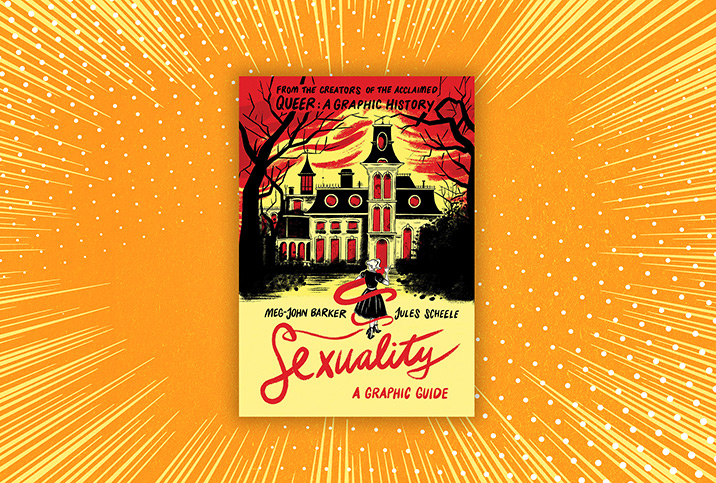Between the Pages: 'Sexology' Is a Jargon-Free Guide to the Basics

Psychotherapist Silva Neves' new book "Sexology: The Basics" is a contemporary manual of human sexuality, eroticism and intimate relationships. The book is part of the so-far 165-book series, "The Basics," by British publisher Routledge, comprising accessible guidebooks that provide a jargon-free overview of specific subjects.
"Sexology: The Basics" is intended for readers who are new to the field of sexology, the study of human sexuality. The 205-page book covers everything from the anatomy and physiology of sexual function to the diversities in sexual behaviors and relationships.
Neves, based in London, specializes in sexual trauma and compulsive sexual behaviors. He is a course director for the Contemporary Institute of Clinical Sexology (CICS). Neves is also the author of "Compulsive Sexual Behaviours: A Psycho-Sexual Treatment Guide for Clinicians."
In this exclusive interview with Giddy, Neves discusses porn myths, sex addiction, sex with robots and more.
Editor's note: This interview has been edited for length and clarity.
What is sexology and why is it important?
Neves: Sexology is the study of human sexuality and intimate relationships. It's focused on sexual behaviors, but it's also the neurobiology of sexuality, sexual diversity, sexual desire, etcetera. I think it's very important because a lot of people are struggling with their sex lives and their relationships because there isn't a lot of sex or relationship education around. A lot of people learn stuff through misinformation or sex myths.
Most people explore their sexuality from their teenage years, and with no sex education, people sometimes go down the wrong path and make mistakes that can be quite wounding. It can create some long-lasting problems with sex and relationships. That's the type of people I see all the time. I find this quite sad because in our schools, we focus so much on academic subjects, and yet this thing that most of us will have experienced is not discussed.
You write that there are a lot of myths surrounding pornography. What are some that you find to be most pervasive?
The biggest myth about pornography is that it's addictive. Another myth is that pornography causes erection problems in young men. A third would be that watching a lot of pornography makes you misogynistic.
Those stories are very, very loud in the media. It's because they're fear-mongering stories, and it's not really always the case. We've just not found any scientific evidence, on the psychology or the neuroscience side, that pornography is addictive.
A lot of people believe pornography is addictive because that's what they've been hearing. Unfortunately, a lot of therapists believe it, too, because that's how they've been trained. The addiction field, unfortunately, is one that makes a lot of money out of getting people to go into their clinics, offering a cure. A lot of people are so afraid of it that they will go to these clinics and pay a lot of money. Because it's a big, profit-making industry, a lot of people don't want to listen to a different narrative about that. That's one of the darker sides of therapy; when you put profit before good information.
If you look at all the studies on pornography, there are so many studies that contradict themselves and so many different opinions. The consensus is that pornography is pretty neutral. It's not great. It's not bad. It's not a public health crisis. It's not a disease. It doesn't make people bad. At the same time, it doesn't make people particularly good, either.
There's debate over whether sex addiction is real. Why do some researchers think you can't be addicted to sex?
In terms of what we understand about addiction, it doesn't fit with sexual behaviors. Some elements in which we understand clinical addiction are not observed in a scientific way. A lot of the knowledge we have is recent. Only in the last 30 years has [sexology] been quite prominent. And just in the last 10 years has the field of sexology really blossomed. For many years, there wasn't a lot of sexology knowledge.
In recent years, we've started to think it is not an addiction because it doesn't work like drug and alcohol addictions, and people are very dubious of behavioral addictions, like gambling. Sexual behaviors do not fit with that. We've kept the term because people have been hearing it for so many years. If someone does behavior that they don't want to do and they can't stop it, it's an addiction. They called it sexual addiction because there was no other formulation to compare it with.
Also, very importantly, the term "sex addiction" started in the 1980s during the AIDS crisis. That's significant, I think, because at the time, people being promiscuous and having a lot of sex was dangerous because of the virus. However, it was also a way to bring back the Christian virtues of abstinence and monogamy and being heterosexual. It was a way to bring back some sex-negative messages to the public. People who were having sex and not in monogamous marriages were then considered dangerous. And so it was easy then to put a disease label on it, and the label chosen was sex addiction. For many years, it was not changed and not challenged.
Many individuals go to sex therapy because they think their sexuality may not be 'normal.' Is this common in your practice?
Oh, my gosh, always. I think this is the first problem for a lot of people coming to see a sex therapist. There's hardly any sex education, so people just believe their sex life is broken or they're broken because it doesn't work as they think it should work.
A lot of people have "should thinking" when it comes to their sex life or their relationship. People say, "Oh, gosh, I don't always have an erection, so it must mean I'm broken. It must be something is wrong with me, so I'm going to get it fixed." Or women might say, "I don't like penetration. It must mean I'm broken. Why can't I do that? Everyone else can."
They ask a sex therapist to fix them. Of course, therapists make an assessment. Most of the time, it's not that anything is wrong with them. There's just a huge diversity of sexual functioning and sexual interests, and sometimes people have sexual issues. They're not having the type of sex that turns them on enough. Or sometimes it's a relationship issue. It can, of course, be because of medical issues, like hormonal problems or heart problems or diabetes.
A lot of times people put so much pressure on themselves to be a certain strict way of having sex. If they're not that way, they'll think they're a bad lover. A lot of the time is spent trying to reframe their mind, try to bring some sex education back to say, "People can have sex without penises. People can have very good sex without penetration. People can have sex five times per day, and other people only want sex once a month. Some people might enjoy vanilla, other people enjoy a bit of spanking and kink."
There's a whole diversity of things that are going on in human sexuality.
What types of studies can we expect to see more of in the field of sexology?
At the moment, there are some fascinating hypotheses about sex and robots. As robot technology improves and becomes more financially accessible to most people, are we going to have more relationships with robots? What's going to happen with our sex lives with machines and devices? It's a new field that, at the moment, belongs to science fiction. I don't think we're very far away from seeing robots introduced to our everyday intimate life. That's one really fascinating area.
Also, definitely more studies on pornography, so we can understand it better. We also need more research on gender diversity because there are so many debates around that at the moment, even around sexual diversity. There are a lot of discussions around that. It would be very good to have more science. It seems like we're stuck in the binary of male/female, heterosexual/gay and kinky/vanilla, and our field could benefit from more research that puts an emphasis on diversity.


















